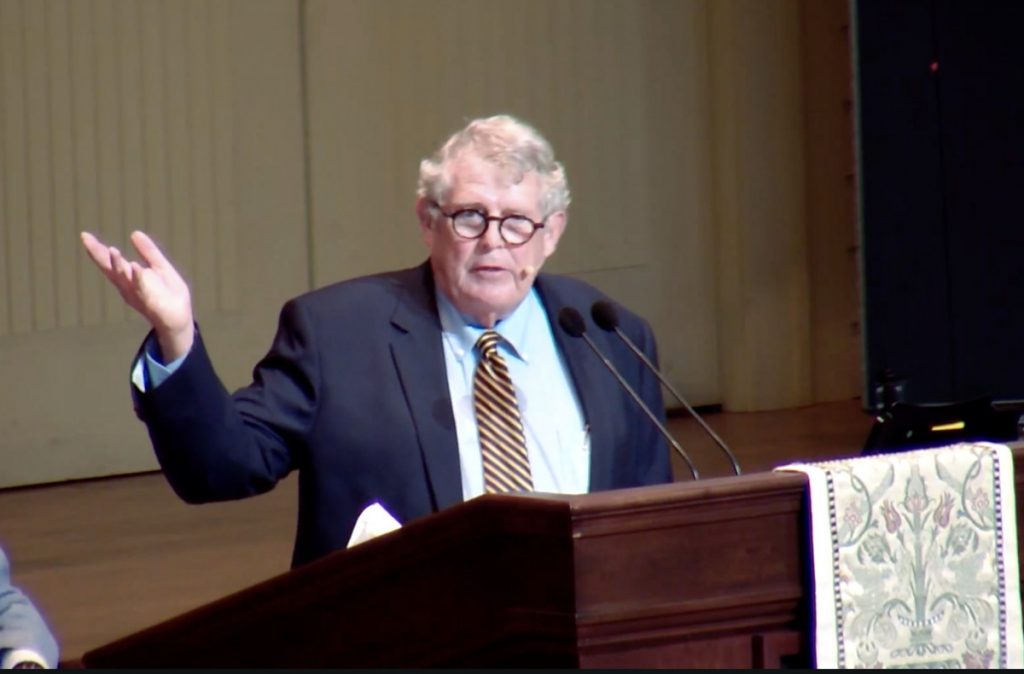MARY LEE TALBOT – STAFF WRITER

“Have you ever lost something?” the Rev. J. Paul Womack asked the congregation during the 9 a.m. Wednesday morning worship service in the Amphitheater. “I have lost my keys, my glasses, my wallet and books.”
Do you know how to find a lost book? “Go buy a second copy and the first will reappear,” he said.
His sermon title was “Lost and Found.” The scripture was Luke 15: 4-6, 8-9, the parables of the lost sheep and lost coin. He was the third guest preacher for the week in place of the Rev. Liz Theoharis.
Womack began his sermon with a story about meeting a choir member on Bestor Plaza on Tuesday. She was searching for a lost water bottle.
“Given (the Rev. George Wirth’s) sermon on Monday, I was challenged to care. Given (the Rev. Mary Lee Talbot’s) sermon on Tuesday, I had the ethical imperative to share,” Womack said. Then he handed choir member Ruth Becker a bottle of water.
Womack said that time had not flowed as it normally does for the past year and a half. “Time was not normal or flowing; it squished. There was no past, present or future, it was just squishy. In those moments, I lost my mind.”
He asked the congregation if they had ever lost something of importance.
“Did you miss it? Would you like to find it?”
In the parables from Luke, a shepherd loses a sheep and a woman loses a coin. These stories are usually told from the point of view of the sheep and the coin.
“The sheep and the coin represent sinners who need to repent,” he said. “I don’t see you as sinners who need to repent. I have seen you as souls who have lost something important and wish to rediscover it.”
The sense of the sacred and awe, of holy mystery, were the first items Womack felt he had lost during the pandemic.
“Will you rejoice with me? Will you witness that what was lost, was found; that what is lost can be found? By the grace of God, faith, hope and love are found. May it be ever for you, and to God be the glory.”
The Rev. J. Paul Womack
“I began to wonder if I was a creature who belongs to the transcendent,” he said. “I had a sense of ‘creatureliness,’ but not the transcendent. I missed the breadth, length, height and depth of the infinite.”
Womack said he also lost the sense of providence or destiny in events.
“Nothing seemed to matter, things were unconnected, just circumstantial,” he said. “The sense of things coming together was lost.”
Faith or engagement were also lost. The value virtues — empathy, kindness — did not seem to matter.
“When we live long enough, we have a sense of the way things come and go,” Womack said. “With the pandemic and the caution we had to employ, (my) sense of holy faith and sacred destiny were just gone.”
In the parables, the shepherd and the woman experience the loss of something valuable, and they each search until they find it. Then they call on their communities to rejoice with them.
“We are called to search, find, call to others and rejoice with them,” Womack told the congregation.
Womack’s father died early on Christmas morning 2020. His father was a towering figure, but emotionally distant.
“He was my emotional opponent,” Womack said. “I wanted to talk and we just couldn’t.”
As he sat with his father, Womack pondered his father’s life. “It dawned on me that I was coming to love this man, and I was grateful for his life,” he said. “I connected the dots of his life with the dots of my life and found providence. I realized he had engaged life the best he could, and I let the holy take over.”
Womack asked the congregation, “Will you rejoice with me? Will you witness that what was lost, was found; that what is lost can be found? By the grace of God, faith, hope and love are found. May it be ever for you, and to God be the glory.”
The Rev. George Wirth presided. Willie La Favor read the scripture. Joshua Stafford, Jared Jacobsen Chair for Organist and director of sacred music, directed members of the Motet Choir in “Give Me Jesus,” arranged by Mark Patterson. The Rev. Debbie Grohman accompanied the choir on clarinet. The postlude was an improvisation on “Prelude on Resignation,” by Zachary Wadsworth. The Gladys R. Brasted and Adair Brasted Gould Memorial Chaplaincy provides support for this week’s services and chaplains.




